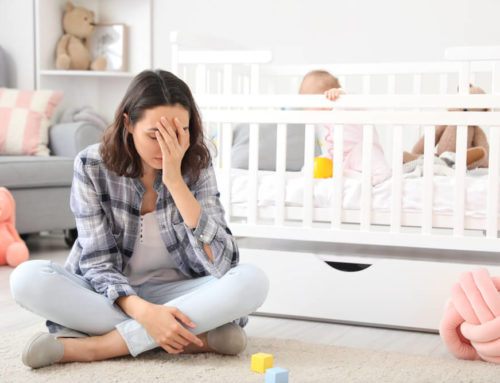For many families, the arrival of a new baby is a time of profound joy, hope, and love. But as any parent will tell you, those early days and months can also be overwhelming, exhausting, and filled with emotional turbulence. One moment, you’re captivated by your baby’s soft breathing; the next, you’re in tears, gripped by worries you can’t explain.
At Trogolo Obstetrics and Gynecology, we know that mental health after childbirth is a crucial piece of a mother’s well-being. Too often, women feel pressured to appear endlessly happy after their baby arrives, even while silently struggling with emotional distress. The truth is, mental health challenges in the postpartum period are far more common than many people realize.
As an obstetrician in Jacksonville, Florida, Trogolo Obstetrics and Gynecology is dedicated not only to caring for women during pregnancy and delivery, but also to ensuring they are supported emotionally in the months that follow. In this article, we’ll explore the signs, symptoms, and solutions surrounding Postpartum mental health: recognizing and managing symptoms, because every new mother deserves compassionate, comprehensive care.
Baby Blues vs. Postpartum Mood Disorders
Many women experience the “baby blues” in the days after delivery. Hormonal shifts, physical recovery, and lack of sleep can leave mothers feeling moody, teary, or anxious. These feelings typically peak around day four or five postpartum and resolve within two weeks.
However, when symptoms persist beyond those initial weeks, or significantly interfere with daily life, it may indicate Postpartum mood disorders. Unlike the transient baby blues, these conditions require medical attention and support. Recognizing the difference is essential for timely care.
Understanding Postpartum Mood Disorders
Postpartum mood disorders is an umbrella term that encompasses a range of mental health conditions that can occur after childbirth. The most well-known is Postpartum depression, but anxiety, obsessive-compulsive symptoms, and even psychosis can also appear in this period.
Let’s explore these disorders in more depth, so you can better identify what might be happening—either in your own life or in someone you care about.
Postpartum Depression: Beyond Sadness
Postpartum depression is not simply feeling sad—it’s a serious medical condition that can affect a woman’s ability to function and bond with her baby. It can begin any time in the first year after birth, sometimes appearing weeks or even months after delivery.
Symptoms of Postpartum depression may include:
- Persistent sadness or hopelessness
- Frequent crying spells
- Irritability or anger
- Loss of interest in activities
- Changes in appetite or weight
- Trouble sleeping (even when the baby sleeps)
- Fatigue or low energy
- Feelings of guilt or worthlessness
- Difficulty bonding with the baby
- Thoughts of harming oneself or the baby
It’s important to emphasize that Postpartum depression is not a personal failure. It is a medical condition, and with treatment, most women recover fully.
Postpartum Anxiety: The Silent Struggle
While Postpartum depression receives significant attention, Postpartum anxiety is equally critical to recognize and often underreported. Many mothers dismiss their worries as “normal new mom nerves,” but Postpartum anxiety can be intense and persistent.
Women experiencing Postpartum anxiety often describe:
- Constant worrying, sometimes about irrational fears
- Racing thoughts that are difficult to control
- Physical symptoms such as a pounding heart, trembling, or dizziness
- Trouble sleeping, even when exhausted
- Panic attacks
- A feeling of impending doom
Unlike depression, where emotions often feel heavy and low, Postpartum anxiety feels like being constantly on high alert. This condition can be deeply disruptive, but it’s highly treatable once identified.
Other Postpartum Mood Disorders
In addition to Postpartum depression and Postpartum anxiety, there are other conditions that fall under the spectrum of Postpartum mood disorders:
Postpartum Obsessive-Compulsive Disorder (OCD)
- Intrusive, distressing thoughts (often violent or harming the baby)
- Compulsions to neutralize these thoughts (e.g., checking repeatedly)
- Severe guilt or shame about the thoughts, even though they are rarely acted upon
Postpartum Psychosis
- Rare but severe, affecting 1–2 women per 1,000 births
- Delusions, hallucinations, confusion
- Requires immediate medical attention and usually hospitalization
Though rare, postpartum psychosis is a medical emergency, and immediate help is crucial.
Why Does Mental Health After Childbirth Suffer?
Understanding mental health after childbirth begins with recognizing the immense changes that accompany the postpartum period. A woman’s body, brain, and entire life shift dramatically in a matter of weeks:
- Hormonal fluctuations: After delivery, estrogen and progesterone levels drop rapidly, contributing to mood swings.
- Sleep deprivation: Broken sleep can make coping with stress far more challenging.
- Physical recovery: Healing from childbirth—vaginal or cesarean—requires time and care.
- Lifestyle upheaval: New routines, feeding schedules, and caregiving demands add significant pressure.
- Identity changes: Motherhood can shift a woman’s sense of self and her relationships.
For many women, these factors intersect and create fertile ground for Postpartum mood disorders. There’s no single cause, and it’s not anyone’s fault. But understanding these stressors helps us create better coping strategies for new mothers.
Risk Factors for Postpartum Mood Disorders
While Postpartum depression and Postpartum anxiety can affect anyone, certain factors increase a woman’s risk:
- Personal or family history of mental health disorders
- High-stress pregnancies or complications during delivery
- Lack of social support
- Financial stress
- Multiples (e.g., twins)
- Traumatic birth experiences
- Hormonal sensitivities
If you have one or more of these risk factors, it’s wise to discuss a postpartum mental health plan with your healthcare team.
Recognizing Symptoms Early
One challenge in caring for mental health after childbirth is that symptoms can appear gradually. Many mothers initially dismiss their struggles as “just being tired” or believe they should “snap out of it.” But Postpartum mood disorders rarely resolve on their own.
Early warning signs might include:
- Difficulty finding joy in caring for the baby
- Withdrawing from loved ones
- Persistent feelings of fear or dread
- Trouble focusing on everyday tasks
- Feeling disconnected from reality (in more severe cases)
We urge new mothers, and those who love them, to watch for these signs and seek help quickly.
Coping Strategies for New Mothers
While professional treatment is often necessary, there are also excellent coping strategies for new mothers that can help manage mild symptoms and support overall well-being.
1. Talk About Your Feelings
Don’t keep emotions bottled up. Sharing your thoughts with your partner, a trusted friend, or a healthcare provider can relieve the sense of isolation many mothers feel.
2. Prioritize Sleep
Sleep deprivation is a major trigger for both Postpartum depression and Postpartum anxiety. Accept help from family or friends so you can rest whenever possible.
3. Stay Nourished
Skipping meals or surviving on coffee alone can worsen mood instability. Try to eat balanced meals—even if small or simple.
4. Get Outside
Fresh air and natural light can have significant mood-boosting effects. Even a short walk around the block can help.
5. Keep Expectations Realistic
Perfection is impossible, especially with a newborn. Give yourself grace.
6. Seek Connection
Joining a support group or connecting with other new moms can be a powerful reminder that you’re not alone.
7. Ask for Professional Help
Therapy, medication, or a combination can be life-changing. These treatments are safe and effective, and many options are breastfeeding-friendly.
These coping strategies for new mothers are tools to help manage stress and anxiety. But they’re not a substitute for medical care when symptoms become severe or persistent.

The Role of Family and Friends
Loved ones play a pivotal role in helping new mothers navigate mental health after childbirth. Partners, family members, and friends should be on the lookout for changes in mood, behavior, or functioning.
Supportive actions include:
- Offering practical help (like cooking meals or caring for the baby)
- Encouraging open conversations about feelings
- Reassuring the mother that seeking help is brave and wise
- Watching for signs of severe distress and urging medical care if needed
Sometimes a gentle nudge from a loved one makes the difference in getting timely help for Postpartum mood disorders.
Treatment Options for Postpartum Mood Disorders
At Trogolo Obstetrics and Gynecology, we understand that postpartum mental health can deeply affect your well-being. During your postpartum visits, we screen for Postpartum depression, Postpartum anxiety, and other Postpartum mood disorders. If you’re struggling, we’re here to listen, support you, and help you explore treatment options.
While we do not provide therapy services directly in our office, we work closely with trusted mental health professionals in the Jacksonville community. Depending on your needs, treatment options might include:
- Therapy: Counseling with a licensed therapist, such as Cognitive Behavioral Therapy (CBT) or Interpersonal Therapy (IPT), which can help you manage negative thoughts and improve coping skills.
- Medication: Antidepressants or anti-anxiety medications can be safe and effective—even while breastfeeding—in many cases. We can help discuss your options and collaborate with psychiatrists if needed.
- Support Groups: Many mothers find comfort in connecting with others who’ve had similar experiences. We’re happy to help you find reputable support groups in our area.
Our goal is to ensure that no woman feels alone in navigating mental health after childbirth. We’re here to help you get the care and resources you deserve.
Postpartum Mental Health and Child Development
Untreated Postpartum depression and Postpartum anxiety can affect a mother’s ability to bond with her baby. Research shows that babies thrive best when mothers receive timely support and treatment. Early intervention protects not only maternal health but also infant development and family well-being.
Breaking the Stigma
Despite growing awareness, stigma around mental health after childbirth remains. Many women fear admitting their struggles will make them seem unfit as mothers. At Trogolo Obstetrics and Gynecology, we strongly reject that notion. Seeking help for Postpartum mood disorders is a courageous, responsible act.
No mother should suffer in silence. Help is available and recovery is possible.
Final Thoughts
At Trogolo Obstetrics and Gynecology, we believe that a mother’s mental health is just as important as her physical health. Postpartum depression, Postpartum anxiety, and other Postpartum mood disorders are medical conditions that deserve prompt care, understanding, and compassion.
If you or someone you love is struggling, please know you are not alone. Let us help you navigate these challenges and reclaim the joy and confidence you deserve in motherhood.
We encourage you to request an appointment with our team if you have any concerns about your mental health during the postpartum period. Together, we can ensure that you and your family receive the support and care you need to thrive.





